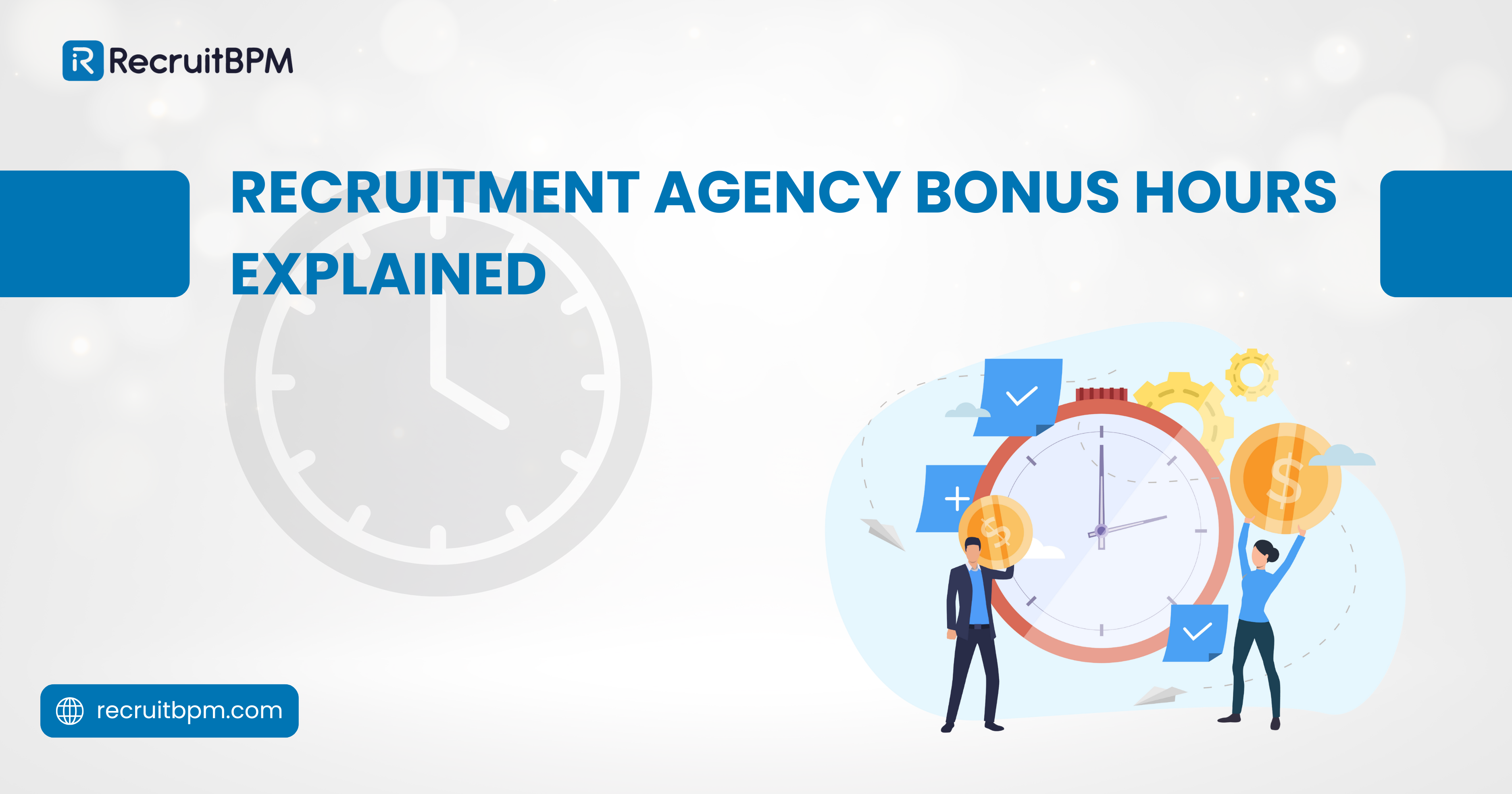Traditional monetary bonuses alone no longer satisfy today’s workforce priorities. Employees increasingly value time over money, seeking a work-life balance that fixed vacation policies cannot provide. Organizations recognizing this shift discover powerful retention and motivation tools beyond compensation increases.
Bonus hours represent an innovative approach to employee recognition that addresses modern workforce values directly. For recruitment agencies, understanding and implementing bonus hours programs creates competitive advantages in attracting talent while building cultures that reduce costly turnover. Mastering bonus hours as both a recruitment positioning tool and an internal retention strategy separates forward-thinking agencies from those relying solely on traditional compensation models.
What are Bonus Hours?
Bonus hours are additional hours added to an employee’s accumulated paid time off as a form of reward or incentive for exceptional performance, tenure milestones, or other valued achievements within the company. Employees can use these bonus hours to take extra time off without affecting their standard paid time off or vacation balances, providing flexibility that traditional PTO policies don’t accommodate.
Purpose
This practice serves to recognize contributions through the increasingly valuable currency of time rather than exclusively through monetary rewards. Unlike standard vacation accrual, which happens automatically based on tenure or employment status, bonus hours are earned through specific achievements, behaviors, or milestones that organizations want to encourage and recognize.
Benefits
Bonus hours differ fundamentally from several related concepts. They are not the same as compensatory time off, which represents time granted instead of overtime pay to balance extra hours worked. Bonus hours are incentives for milestones or performance, not compensation for time already invested. They also differ from standard PTO accrual, which happens automatically, whereas bonus hours require earning through specific achievements.
Flexibility
The flexibility of bonus hours makes them particularly valuable. Organizations can award them for completing major projects successfully, exceeding performance targets, demonstrating exemplary teamwork or leadership, reaching service anniversary milestones, participating in professional development, contributing innovative ideas, or maintaining perfect attendance records. Since bonus hours isn’t a standardized term in human resource management, its interpretation can vary greatly between organizations. Some companies integrate them into formal recognition programs with clear earning criteria, while others award them informally based on a manager’s discretion. This flexibility allows customization, matching organizational culture and values.
Why Bonus Hours Matter for Recruitment Agencies?
The recruitment industry faces intense competition for both client business and internal talent. Bonus hours programs address multiple strategic challenges simultaneously, creating competitive advantages in crowded markets.
Work-life balance priorities drive candidate decisions
Modern professionals, especially younger generations, prioritize flexibility and time autonomy over purely financial considerations. Organizations offering bonus hours demonstrate commitment to employee well-being beyond rhetoric. This authentic value proposition attracts quality candidates who might reject higher-paying opportunities lacking this flexibility.
Retention improvements reduce costly turnover
Recruitment agencies experience particularly high turnover due to demanding workloads and burnout risks. Bonus hours provide pressure-release mechanisms that help high performers sustain productivity without burning out. When valued employees can earn additional recovery time through exceptional performance, they remain engaged longer than peers at agencies without such programs.
Performance incentivization extends beyond financial rewards
Not every achievement warrants monetary bonuses that strain budgets or create compensation inequities. Bonus hours offer meaningful recognition for accomplishments that deserve acknowledgment but don’t justify cash bonuses. This expanded reward toolkit enables more frequent positive reinforcement without proportional cost increases.
Cultural messaging attracts values-aligned talent
Bonus hours policies reflect a company culture that values employee well-being and work-life balance. It sends a message that the company recognizes and rewards efforts not just monetarily but also by giving them the gift of time. Recruitment agencies marketing this distinctive benefit attract candidates specifically seeking this value alignment.
Competitive differentiation in saturated markets
Most recruitment agencies compete on commission structures and base compensation. Bonus hours programs create differentiation that helps agencies stand out during recruitment. When talented recruiters evaluate opportunities, innovative benefits like bonus hours signal progressive cultures willing to invest in employee satisfaction beyond traditional models.
Client positioning opportunities emerge
Recruitment agencies successfully implementing bonus hours programs can advise clients about this emerging benefit category. Consultative positioning on innovative retention strategies strengthens client relationships while potentially generating additional consulting revenue streams beyond placement fees.
Cost-effectiveness compared to financial bonuses
Bonus hours provide meaningful recognition at a lower direct cost than equivalent monetary bonuses. While employees receive valuable time off, agencies don’t incur cash outlays—only the opportunity cost of reduced work hours. This favorable cost-benefit ratio makes bonus hours sustainable even during economic downturns when cash bonuses get cut.
Flexibility supports diverse employee needs
Different life stages and personal circumstances create varied benefits and preferences. Parents value additional time with children, caregivers need flexibility for responsibilities, and burnout-prone high performers benefit from recovery periods. Bonus hours accommodate these diverse needs better than one-size-fits-all benefits, improving overall satisfaction across varied workforces.
How to Use Bonus Hours Effectively?
Implementing bonus hours programs successfully requires strategic design, clear communication, and systematic administration that prevents misuse while maximizing motivational impact.
Establish clear earning criteria and guidelines
Develop specific circumstances under which bonus hours can be awarded, defining both quantitative metrics (sales targets, placements completed) and qualitative achievements (exceptional client feedback, innovative process improvements). Clarity prevents perceptions of favoritism while ensuring consistent application across the organization.
Set reasonable accrual limits
Determine the maximum bonus hours employees can accumulate to prevent excessive accumulation that creates operational challenges. Unlimited accrual might sound generous, but it creates coverage problems when employees eventually use large balances simultaneously. Caps between 40-80 hours provide meaningful rewards without unmanageable operational disruption.
Integrate with existing time-off systems
Bonus hours should complement rather than complicate PTO administration. Use the same tracking systems, request processes, and approval workflows as standard vacation. This integration simplifies administration while ensuring bonus hours receive equivalent treatment to earned PTO.
Communicate program value clearly and frequently
Employees must understand how to earn bonus hours and what they represent. Regular reminders about earning opportunities, celebrations when bonus hours are awarded, and transparent tracking ensure the program delivers the intended motivational impact. Invisible programs generate no engagement regardless of design quality.
Create diverse earning pathways
Don’t limit bonus hours to single achievement categories. Offer multiple earning mechanisms, including individual performance, team accomplishments, innovative contributions, continuous improvement suggestions, professional development completion, and service milestones. Variety ensures all employees have realistic earning opportunities regardless of role or tenure.
Award bonus hours promptly after achievements
Recognition loses impact when delayed. Implement processes enabling managers to award bonus hours immediately upon accomplishment verification. Quick recognition reinforces desired behaviors more effectively than annual awards distributed long after triggering achievements.
Track utilization and effectiveness systematically
Monitor how many bonus hours are awarded, to whom, through which earning pathways, and how frequently employees use them. Analyze whether the program correlates with improved retention, higher performance, or increased engagement scores. Data-driven evaluation enables continuous refinement.
Balance operational needs with flexibility
While bonus hours provide flexibility, unrestricted use creates coverage challenges. Establish reasonable notice requirements for bonus hours usage similar to standard PTO policies. Black-out periods during peak seasons might be necessary, but excessive restrictions undermine program value.
Consider allowing partial-day usage
Requiring full-day increments limits bonus hours utility. Allowing half-day or even hourly usage maximizes flexibility, enabling employees to attend school events, medical appointments, or simply leave early after intense work periods. Granular usage increases practical value significantly.
Evaluate transfer or gifting policies thoughtfully
Some organizations allow employees to gift bonus hours to colleagues facing personal challenges or urgent needs. This promotes a supportive culture but requires careful policy design to prevent abuse. If implementing, establish clear guidelines about eligible circumstances and approval processes.
Address unused balances upon separation clearly
Define whether unused bonus hours are paid out when employees leave, forfeited entirely, or handled differently than standard PTO. Clear policies prevent disputes while ensuring compliance with applicable labor laws governing accrued paid time off.
Combine bonus hours with other recognition programs
Bonus hours work best as one component within comprehensive recognition strategies, including verbal praise, financial bonuses, career development opportunities, and public acknowledgment. Multi-faceted recognition addresses diverse motivation drivers more effectively than single-dimensional approaches.
Common Challenges with Bonus Hours
Despite significant benefits, bonus hours programs introduce implementation and administration challenges that require thoughtful management to maintain effectiveness and fairness.
Subjective earning criteria create fairness concerns
When bonus hours depend on a manager’s discretion rather than objective metrics, perceived favoritism damages morale. Employees who believe awards reflect personal relationships rather than merit become disengaged. Establishing objective earning criteria wherever possible reduces these fairness concerns, though some subjectivity remains inevitable for qualitative achievements.
Accrual tracking complexity burdens administration
Managing separate bonus hours balances alongside standard PTO, sick leave, and possibly other time-off categories creates administrative overhead. Without integrated systems, manual tracking produces errors that frustrate employees and create compliance risks. Technology investment becomes necessary for sustainable program administration.
Usage patterns create coverage challenges
If multiple high performers earn and use bonus hours simultaneously, coverage gaps disrupt operations. Agencies must balance deserved flexibility against operational continuity needs. Staggered usage requirements and advance notice policies help manage this tension but don’t eliminate it.
Labor laws governing accrued paid time off vary significantly by jurisdiction. Some locations mandate payout of all accrued PTO upon termination, raising questions about whether bonus hours constitute legally protected accrued time off or discretionary perks. Legal consultation ensures compliance while designing bonus hours programs.
Program value inflation requires budget considerations
As programs mature and more employees earn bonus hours, the aggregate time-off liability grows. While not typically paid out like monetary bonuses, extensive bonus hours usage reduces available work capacity. Agencies must account for this capacity impact when planning workload and hiring needs.
Earning opportunity inequity across roles
Some positions offer clearer performance metrics enabling straightforward bonus hours earning, while others involve less measurable contributions. Sales roles with obvious placement counts differ from support roles with nebulous success indicators. Creating equitable earning pathways across diverse functions challenges program designers.
Managerial consistency varies without strong governance
Different managers might apply earning criteria inconsistently, some being generous and others stingy with bonus hours awards. This inconsistency creates internal equity issues where identical achievements receive different recognition depending on manager’s style. Regular calibration sessions and oversight mechanisms improve consistency.
Expectations escalation diminishes special recognition
As programs mature, bonus hours may shift from special recognition to expected entitlement. Employees begin viewing them as standard compensation rather than performance rewards. This expectation shift reduces motivational impact while maintaining administrative burden. Periodic program refresh maintains specialness.
Communication gaps undermine program effectiveness
Many employees don’t fully understand how to earn bonus hours or fail to appreciate their value relative to monetary rewards. Inadequate communication means programs fail to deliver intended motivation despite organizational investment. Ongoing education ensures employees recognize and pursue earning opportunities.
Economic downturn pressure creates an elimination risk
During financial stress, organizations examine all benefit programs for cost-cutting opportunities. While bonus hours don’t create direct cash outlays, the perceived cost of reduced work hours makes them vulnerable to elimination. Once removed, reinstating lost benefits proves difficult, and elimination damages employee trust substantially.

















